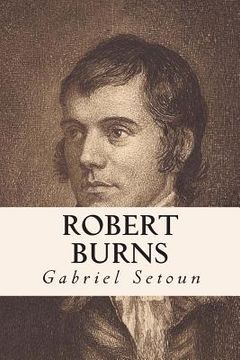Reseña del libro "Robert Burns (en Inglés)"
Robert Burns, by Gabriel Setoun, is a definitive biography of the great Scottish poet and lyricist. Of the many biographies of Robert Burns that have been written, most of them laboriously and carefully, perhaps not one gives so luminous and vivid a portrait, so lifelike and vigorous an impression of the personality of the poet and the man, as the picture the author has given of himself in his own writings. Burns's poems from first to last are, almost without exception, the literary embodiment of his feelings at a particular moment. Robert Burns (25 January 1759 - 21 July 1796), also known as Rabbie Burns, the Bard of Ayrshire, Ploughman Poet and various other names and epithets, was a Scottish poet and lyricist. He is widely regarded as the national poet of Scotland and is celebrated worldwide. He is the best known of the poets who have written in the Scots language, although much of his writing is also in English and a light Scots dialect, accessible to an audience beyond Scotland. He also wrote in standard English, and in these writings his political or civil commentary is often at its bluntest. He is regarded as a pioneer of the Romantic movement, and after his death he became a great source of inspiration to the founders of both liberalism and socialism, and a cultural icon in Scotland and among the Scottish diaspora around the world. Celebration of his life and work became almost a national charismatic cult during the 19th and 20th centuries, and his influence has long been strong on Scottish literature. In 2009 he was chosen as the greatest Scot by the Scottish public in a vote run by Scottish television channel STV. As well as making original compositions, Burns also collected folk songs from across Scotland, often revising or adapting them. His poem (and song) "Auld Lang Syne" is often sung at Hogmanay (the last day of the year), and "Scots Wha Hae" served for a long time as an unofficial national anthem of the country. Other poems and songs of Burns that remain well known across the world today include "A Red, Red Rose", "A Man's a Man for A' That", "To a Louse", "To a Mouse", "The Battle of Sherramuir", "Tam o' Shanter" and "Ae Fond Kiss". Robert Burns's style is marked by spontaneity, directness, and sincerity, and ranges from the tender intensity of some of his lyrics through the humour of "Tam o' Shanter" and the satire of "Holy Willie's Prayer" and "The Holy Fair". Robert Burns's poetry drew upon a substantial familiarity with and knowledge of Classical, Biblical, and English literature, as well as the Scottish Makar tradition. Robert Burns was skilled in writing not only in the Scots language but also in the Scottish English dialect of the English language. Some of his works, such as "Love and Liberty" (also known as "The Jolly Beggars"), are written in both Scots and English for various effects. His themes included republicanism (he lived during the French Revolutionary period) and Radicalism, which he expressed covertly in "Scots Wha Hae", Scottish patriotism, anticlericalism, class inequalities, gender roles, commentary on the Scottish Kirk of his time, Scottish cultural identity, poverty, sexuality, and the beneficial aspects of popular socialising (carousing, Scotch whisky, folk songs, and so forth). The strong emotional highs and lows associated with many of Burns's poems have led some, such as Robert Burns biographer Robert Crawford, to suggest that he suffered from manic depression-a hypothesis that has been supported by analysis of various samples of his handwriting. Burns himself referred to suffering from episodes of what he called "blue devilism". The National Trust for Scotland has downplayed the suggestion on the grounds that evidence is insufficient to support the claim.

